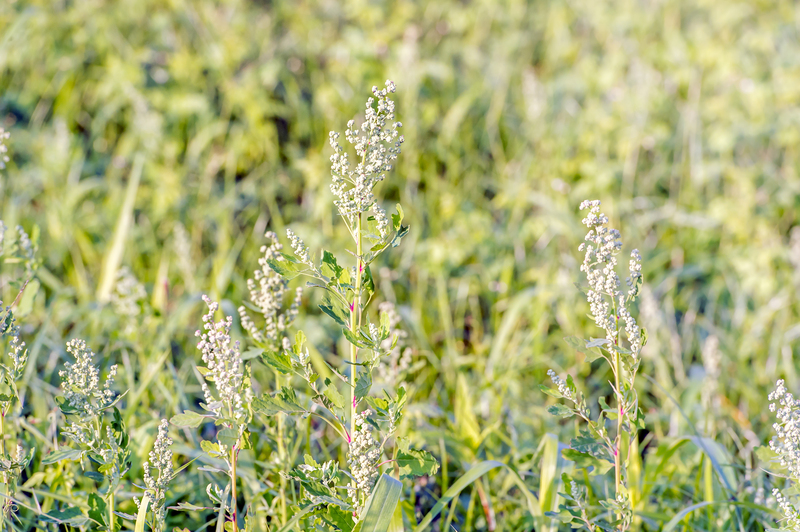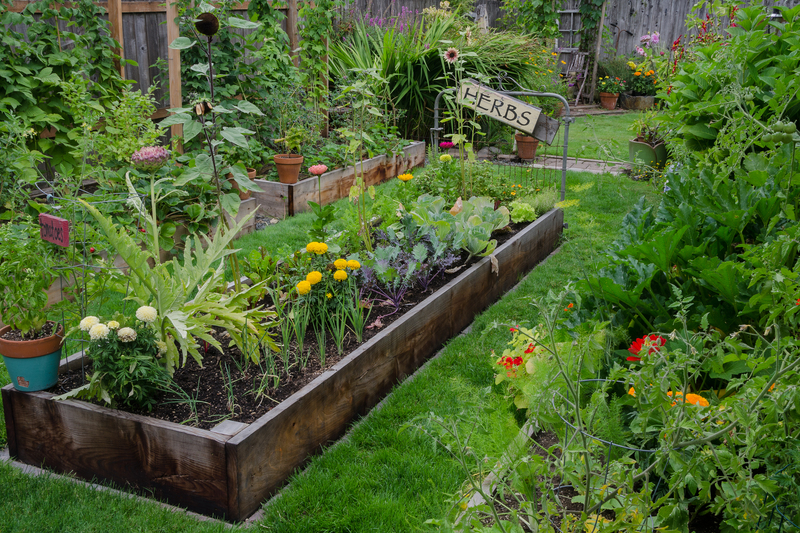Waste to Wealth: Creating Fertile Ground
Posted on 30/08/2025
Waste to Wealth: Creating Fertile Ground
Transforming waste into valuable resources is not only a pressing environmental need, but also a lucrative opportunity. The concept of waste to wealth revolves around the ingenious idea of converting organic and inorganic waste materials into productive, fertile ground, whether that's literal soil improvement for agriculture or the creation of profitable business models. In this comprehensive article, we will delve deeply into the world of waste conversion, sustainable practices, and innovative methods that enable communities and businesses to turn their waste problems into wealth-generating ventures.

Understanding the Waste to Wealth Concept
The waste to wealth strategy encompasses a range of techniques aimed at repurposing various forms of waste into economically and socially valuable products. This can take the form of:
- Composting organic waste to enhance soil fertility
- Recycling plastics, metals, and glass to reduce landfill and generate materials for manufacturing
- Extracting biogas and other forms of renewable energy from food and industrial waste
- Upcycling construction and demolition debris into new building materials
- Generating employment and income streams for communities
The Journey from Waste to Fertile Ground
One of the most profound applications of the waste to wealth paradigm is the creation of fertile ground through the transformation of organic waste. Let's explore how different types of waste can be harnessed for agricultural productivity and environmental restoration.
Composting: Nature's Recycling Process
Composting is the natural decomposition of organic matter -- such as vegetable scraps, yard trimmings, manure, and paper -- to create nutrient-rich compost. This process not only reduces the volume of waste sent to landfills, but also nourishes the soil, supporting robust plant growth.
- Benefits of composting:
- Improves soil structure and fertility
- Enhances water retention in soil, reducing irrigation needs
- Suppresses plant diseases and pests
- Reduces demand for chemical fertilizers
By converting household and agricultural waste into compost, individuals and communities can create fertile ground for crops, gardens, and green spaces, fostering self-sufficiency and environmental stewardship.
Vermicomposting: Harnessing Earthworms for Richer Soil
A specialized form of composting, vermicomposting, utilizes the digestive abilities of earthworms to convert organic matter into a highly potent soil amendment called vermicast or worm castings. This method:
- Significantly accelerates the decomposition process
- Produces compost with higher microbial activity and plant nutrients
- Requires minimal space and can be practiced on a small scale, even indoors
Vermicomposting is especially beneficial for urban settings where space is limited, turning kitchen scraps into wealth for greening rooftop gardens, balconies, or community parks.
Biochar: Carbon-Rich Soil Amendment
Biochar is an innovative approach in the waste to wealth system that involves the pyrolysis (thermal decomposition in the absence of oxygen) of biomass waste, such as crop residues, wood chips, or even manure.
- Biochar retains carbon in a stable form, helping to combat climate change by sequestering carbon in the soil.
- It enhances soil fertility by improving nutrient retention and fostering beneficial microbial communities.
- Biochar-enriched soils deliver higher crop yields and resilience against drought.
Through biochar production, agricultural societies can turn post-harvest residues into a valuable input for creating truly fertile ground.
Industrial Approaches: Unlocking the Wealth in Urban Waste
While organic waste is readily transformed into soil amendments, non-organic urban and industrial waste streams also offer substantial potential for wealth creation.
Recycling: Giving New Life to Old Materials
According to the latest data, urban centers generate millions of tons of plastic, metal, glass, and electronic waste every year. These materials, if improperly disposed of, pose significant environmental hazards. However, robust recycling systems can extract immense value from them:
- Recycled plastics become raw material for new containers, fashion items, or construction panels.
- Recovered metals are reprocessed for electronics, vehicles, and infrastructure.
- Crushed glass returns to the market as bottles, tiles, or road base.
- E-waste recycling yields precious metals and components for new technologies.
By treating urban waste as a resource, industries and municipalities are contributing to sustainable urban growth while generating jobs and new economic avenues.
Waste-to-Energy: Powering Communities Sustainably
Another pillar of the waste to wealth movement is harnessing the energy potential of landfill or industrial waste:
- Biogas plants convert food and agricultural waste into methane, fueling electricity generation or clean cooking gas.
- Incineration with energy recovery provides thermal power while reducing landfill volumes.
- Waste-derived biodiesel from used cooking oil or animal fats drives vehicles and machinery.
These technologies reduce our reliance on fossil fuels and convert problematic waste streams into reliable sources of energy.
Economic and Social Benefits of Waste to Wealth Initiatives
The impact of turning waste into wealth is multilayered, with profound economic, social, and environmental dividends.
Job Creation and Income Generation
The waste to wealth movement has proven to be a powerful tool for empowering communities. Collection, sorting, recycling, composting, and the manufacturing of waste-based products all create employment opportunities, especially for marginalized groups and rural populations. Women's self-help groups and youth cooperatives thrive in composting and recycling initiatives, contributing to both family incomes and community well-being.
Entrepreneurial Opportunities
With growing environmental awareness, there is an upsurge in waste-to-wealth startups. Entrepreneurs have established businesses ranging from compost production and farm-to-table gardens to upcycled fashion and eco-friendly home decor. These efforts find fertile ground in markets eager for sustainable products, and demonstrate that sustainability can drive profitability.
Supporting Circular Economy Principles
Waste to wealth approaches foster a circular economy, where resources circulate in use for as long as possible and waste is designed out of the system. This reduces the strain on landfill sites, curbs pollution, and conserves precious natural resources. The shift towards circularity is vital for a sustainable future.
How Individuals and Communities Can Get Involved
You don't have to be an industrialist or a large-scale farmer to participate in the waste to wealth transformation. There are simple, impactful steps for everyone to help create fertile ground and contribute to environmental health:
- Start a backyard or balcony compost bin for organic kitchen waste.
- Set up a vermicomposting station for richer, faster composting -- perfect for apartment dwellers.
- Separate recyclables from household waste and participate in local recycling programs.
- Purchase and support products made from recycled or upcycled materials.
- Advocate for and participate in community clean-up and tree-planting drives.
- Educate neighbors and friends about the benefits of turning waste into wealth.
Case Studies: Waste to Wealth Success Stories
Across the globe, innovative projects are redefining what waste means. Here are some inspiring examples:
Urban Composting Initiatives
Cities like San Francisco and Bangalore have implemented curbside composting, diverting hundreds of thousands of tons of organic waste from landfills annually. The resulting compost is used in urban agriculture and landscaping, creating greener, healthier cities.
Community-Based Recycling Cooperatives
Brazil's renowned waste-picker cooperatives have professionalized recycling, drastically increasing recycling rates and providing steady incomes and social services to thousands of families.
Biochar Agroforestry in Africa
In sub-Saharan Africa, farmers use agricultural residues to produce biochar, significantly improving soil fertility in degraded landscapes and boosting food production while sequestering carbon.

Challenges and the Way Forward
While the benefits of waste to wealth are immense, there are hurdles to widespread adoption:
- Lack of awareness or knowledge about composting and recycling technologies
- Initial investment required for some waste processing equipment
- Regulatory obstacles and lack of supportive policy frameworks
- Market limitations for recycled and composted products
Conclusion: The Promise of Turning Waste to Wealth
The journey from waste to wealth is at once a grassroots movement and a global imperative. As we face rising environmental crises, harnessing waste for the creation of fertile ground -- whether for agriculture, industry, or entrepreneurship -- stands as one of the most effective and inspiring solutions. By embracing the vast potential locked in our waste streams, we forge a more sustainable, healthier, and wealthier future for all. Start your own journey today, and be part of the revolution that is creating genuine value from what was once discarded.
Frequently Asked Questions
- What types of waste can be turned into wealth?
Almost any waste -- organic, inorganic, industrial, or municipal -- offers value when processed or upcycled using modern methods. - How does waste to wealth benefit the environment?
It reduces landfill use, cuts methane emissions, prevents pollution, and restores natural resources. - Can waste to wealth projects generate real income?
Yes, through compost sales, recycling businesses, waste-driven energy, and upcycled products, communities and entrepreneurs can thrive.
Explore the waste to wealth movement, and join the global quest for creating fertile, profitable, and sustainable ground for generations to come!
Latest Posts
Innovative Weed Control Practices: 3 Tips to Try
Expert Tips to Keep Your Garden Safe from Severe Weather Hazards
Aesthetic Hedge Trimming: Techniques for Eye-Catching Geometry

